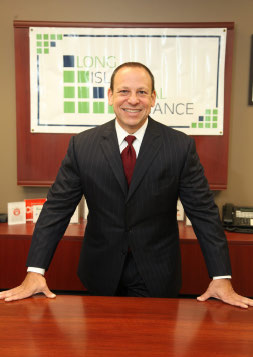By: Christine Giordano (Reporter at Newsday)
April 21, 2014
Link to original article: Click here to view
Picture above: Neil M. Kaufman, chairman of LI Capital Alliance, holds forums targeted to bio-tech, tech, health care and consumer products.
Although it’s tougher now than it was before the 2008 crash, small and midsized Long Island companies can still raise money from venture capitalists, says Neil M. Kaufman, chairman of the board of the Long Island Capital Alliance in Melville. The 30-year-old alliance is focused on connecting promising growth-stage firms with investors willing to put up between $1 million and $10 million.
More than that amount could swamp a small firm, says Kaufman, but that midlevel investment range can be hard to find. If megafirms with billions of dollars under management invested those dollars in $1 million to $2 million pieces, “they’d be managing a thousand companies,” he says.
LICA reaches out to private equity firms, financial advisers and high-net-worth individuals, as well as venture capitalists, inviting them to industry-targeted forums to hear local companies present their business plans. The forums also feature industry experts discussing the investment climate for those companies.
Kaufman, 53, is chairman of the corporate department of Abrams, Fensterman, Fensterman, Eisman, Formato, Ferrara & Wolf LLP in Lake Success. Working as a lawyer for tech companies in the ’90s prepared him to become board chairman of Allegro New Media, which raised $40 million over a seven-year period before the tech bubble burst. Allegro eventually dissolved after the tech crash, but not before “every investor that bought into that company had an opportunity to sell at a substantial profit in 1999 when the stock was soaring,” he said.
What are the challenges of building a tech company on Long Island?
It’s hard to build a tech company anywhere. Unless you continually develop and refine your technology, your competitors overtake you. So you have to be continually at the top of your game. That’s the challenge even for the mature company. I don’t think Long Island is any more challenged than anywhere else. The cost of real estate and employees and everything else is actually higher in Silicon Valley, and higher in Boston, and higher in Manhattan than it is on Long Island. Plus, Long Island has a huge reservoir of very talented, driven people that are a tremendous asset. [But] I think one of the major challenges we face is that, unlike other regions, the Long Island business community does not behave in a cohesive manner, [compared with] various regions around the country that promote themselves cohesively and aggressively.
CORPORATE SNAPSHOT:
Name: Neil M. Kaufman, chairman of the board, Long Island Capital Alliance in Melville
What it does: Assists local companies in raising growth capital by hosting quarterly, industry-focused forums at which business present their business plans to investors
Employees: 1 part time, 12 volunteers
Budget: $50,000-75,000
How does LICA help raise capital for companies?
We’re trying to set up a pathway for an early-stage company to get seed-level funding from one of the several seed- level investors on Long Island like Can- rock Ventures or Accelerate Long Island or some others. And then, when they’re ready for the next level, to be able to get a few hundred thousand dollars of angel financing from the Long Island Angel Network. And then come to Long Island Capital Alliance and present to our group of investors when they need to raise a million dollars or more.
What are most investors looking for?
A strong return on investment. Right now, biotech and technology are hot. We have found that in the Long Island economy there are primarily four clusters of companies that we see that are of potential interest to investors: biotech companies, which primarily come out of our research institutions; technology companies; consumer products companies; and health care companies. From what we can tell, those are the four main pillars of the future of the Long Island economy. We try to cover each one of those industries [with an investor forum] about once a year.
Why do you target your forums?
Most investors are not generalist funds. They’re a specialist in biotech, consumer products, or software and technology … So we’ve restructured our capital forums to focus on particular industries.
What types of mentors are you seeking for the companies that present at your forums?
We have a lot of smart people, a lot of different people, but we don’t have enough proven entrepreneurs who have already done it, who have already started a company, attracted investors, built the company and then sold it or took it public and exited it.
What should companies keep in mind when they’re seeking investors?
You need to convince an investor that they are likely to make a lot of money on your company, that there’s a huge market for your products or services, and that you have both a good plan for penetrating that market and the management capability to implement that plan.
Do venture capitalists look for that MBA at the senior level, or is the field still open for the dropout who’s also a computer genius?
Anecdotally there are always stories about the Bill Gateses of the world and the Facebooks of the world. I don’t think that it’s a prerequisite to have an MBA at all, but it helps a lot if there are people on your management team that have a proven track record of being able to successfully build it.
What’s a recent success story?
At our cybersecurity capital forum in December 2012, one of the attendees at the event introduced David Antar, owner of A+ Technologies, to a Long Island-based investment firm, which invested $12 million to enable that company to grow and expand.
How do you find investors?
We don’t do cold calling, but we try to keep track of who’s out there. Many of the members of our board of directors have relationships with a number of investors. We keep a list. We try to keep track of what they like to invest in, and then we invite them, we reach out to them personally, and they come. When we invite the ones who are interested in the sector that we’re highlighting at that event, they’re more likely to come. They come from many of the local investment funds, and many people come from Manhattan as well as New Jersey, Connecticut and elsewhere.
What are some other industries you’ve targeted?
We did a capital forum for cybersecurity companies, because there were enough good cybersecurity companies that we found on Long Island to make it worthwhile. We put on a capital forum for social media companies, because we found there were enough of those on Long Island to form a critical mass and bring investors to Long Island for a morning. We tried to do one for manufacturing companies but didn’t find enough attractive manufacturing companies to justify running that event.
Most startups fail. How does taking the risk pay off for investors?
For your typical investment fund, most of the investments are not going to work out. The ratio is that out of every 10 investments, two will turn out to be great and provide a huge multiple of your investment on them. Then the trick is to get your money back as much as possible from the ones that don’t work out. But a 10 to 20 percent success rate, in terms of a home run investment, is not unusual. If you’re taking money out of the bad deals and then make 10, 20 times your money on the good deals, you end up with a decent investment return.
How do investors usually make back their money?
They don’t usually make their money by getting dividends off the profits. They usually make their money when the company gets sold or it goes public and they sell their stock into the public market. For the investor it’s all about the exit event.
So they’re looking to have that happen as quickly as possible?
Most companies — especially investors that invest in relatively early-stage companies, which is what we mostly see — have a horizon of at least several years, and sometimes I’ve seen investments where the investors are in a company for 10 years or more. That’s incredibly patient capital. Most of the time they have an investment horizon of three to five years.
What’s your goal with LICA?
The hope is that by growing the pie on Long Island as much as possible, we can create enough economic activity for the whole region to be successful in the long run.

